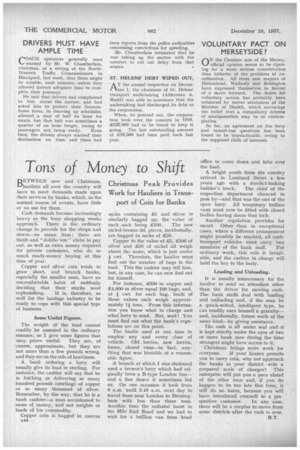Tons of Money to Shift
Page 26

If you've noticed an error in this article please click here to report it so we can fix it.
Christmas Peak Provides Work for Hauliers in Transport of Coin for Banks
BETWEEN now and Christmas, hauliers all over the country will have to meet demands made upon their senriceshy banks, which, in the normal course of events, have little or no use for them.
Cash demands become increasingly heavy as the busy shopping weeks approach.' There is the ordinary change to provide for the shops and stores—,-no mean item; there are thrift and " diddle-'em " clubs to pay out, as well as extra money required for private customers, who do so much ready-money buying at this time of year.
Copper and silver coin tends to grow short, and branch banks, especially the smaller ones, have an uncomfortable habit of suddenly deciding that their stocks need replenishing. It is, therefore, as well for the haulage industry to be ready to cope with this special type of business.
Some Useful Figures.
The weight of the load cannot readily be assessed in the ordinary manner, so I give some figures that may prove useful. They are, of course, approximate, but they are not more than a few pounds wrong, and they err on the side of heaviness.
A bank ordering a lorry will usually give its load in sterling. For instance, the cashier will say that he is fetching or delivering so many hundred pounds (sterling) of copper or so many thousand of silver. Remember, by the way, that he is a bank cashier—a man accustomed to sums of money, and not weights or loads of his commodity.
Copper coin is bagged in canvas a44
sacks containing £5 and silver is similarly bagged up, the value of
each sack being £100. The new nickel-bronze 3d. pieces, incidentally, are bagged in sacks of £20.
Copper to the value of £5, £100 of silver and £20 of nickel all weigh about the same, which is just under f cwt. Therefore, the haulier must find out the number of bags in the load. This the cashier may tell him, but, in any case, he can now find out for himself.
For instance, £300 in copper and £4,000 in silver equal 100 bags, and, at cwt. for each bag, loads of those values each weigh approximately If tons. From this information you know what to charge and what lorry to send. But, wait You must find out what the bank's regulations are on this point.
The banks used at one time to employ any and every class of vehicle. Old. lorries, new lorries, limes, closed vans—in fact, anything that was hireable at a reason:. able figure.
A branch at which I was stationed used a brewer's lorry which had originally been a B-type London bus-and a fine dance it sometimes led us. On one occasion it took from 8 a.m. until 2.45 a.m. next day to travel from near London to Birmingham with less than three tons. Another time the radiator burst in the Mile End Road and we had to wait for a bullion van from head office to come down and take over the load.
A bright youth from the country arrived in Lombard Street a few years ago with a derelict-looking builder's truck. The chief of the inspection department chanced to pass by—and that was the end of the open lorry. All temporary bullion vans must now be fitted with closed bodies having doors that lock.
Another regulation provides for escort. Other than in exceptional cases, where a different arrangement might possibly be readied, all cashtransport vehicles must carry two
members of the bank staff. For ordinary work, this rule is invariable, and the cashier in charge will hold the key to the body.
Loading and Unloading.
It is usually unnecessary for the haulier to send an attendant other than the driver for moving cash. The bank staffs deal with loading and unloading and, if the man be a quick-witted, intelligent type, he can readily earn himself a gratuity—. and, incidentally, future work of the same kind—by giving assistance.
The cash is all under seal and it is kept strictly under the eyes of two or more bank men during the time strangers might have access to it.
Christmas brings more work for everyone. If your licence permits you to carry coin, why not approach the banks in your district with a prepared scale of charges? This enterprise will put you a pace ahead of the other man and, if you do happen to be too late this time, it will do no harm, because you will have introduced yourself to a pma spective customer. In any case, there will be a surplus to move from some districts after the rush is over. B.T.




























